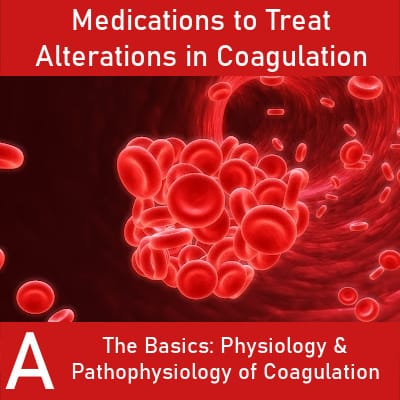Description
Single Webinar:
This webinar is part of a two-part series.
Duration:
120 minutes including a Q&A
Includes:
• A certificate of completion
• The on-demand recording to watch at your convenience
• A handout in PDF format for viewing or self-printing
Objectives of Part A: The Basics: Physiology of Coagulation
1. Describe the physiology of clot formation and fibrinolysis.
2. Understand the role of hemostasis within the context of immune function and the stress response.
3. Discuss the disease pathologies that promote clotting.
4. Discuss the disease pathologies that promote bleeding.
5. Understand the iatrogenic causes of alterations in clotting related to the critically ill patient.
Description:
While coagulation is an elegant physiologic process, it can also go awry, causing unexpected clotting or bleeding, creating the need for pharmacological interventions. In this two-part webinar, we’ll cover the mechanisms of clot formation and fibrinolysis; the pathologies associated with clotting and bleeding including iatrogenic causes; and we’ll review the three classes of medications used to intervene: anticoagulants, thrombolytics and antiplatelets. We’ll review which drugs are used when; help you to understand how to administer them; and the key assessments and lab values you need to be aware of. Finally, we’ll review the important precautions, contraindications, and toxicology, including reversal agents, for both the oldest and newest medications in these three drug classes. Please join our speakers: Joan Harris RN, MSc., MHSc; Holly Feist, RN, BN, MN, ACCN; and Joanne Bouma, RN MN from the Mount Royal University Faculty of Nursing in Calgary for this important webinar.
Who Should Attend?:
• All Nurses in Any setting working with Anticoagulants, Thrombolytics & Antiplatelet drugs
• Med Surg Nurses; Critical Care Nurses in all settings: ICU, CICU, CVICU, MICU, SICU, OR & PACU
• Specialized Cardiac & Cath Lab Staff; Medical Students, Post Grad RN Students
• Nurses Planning to Work, or Newly working in Cardiac, Neuro and Critical Care areas
• Nurse Practitioners,Clinical Nurse Specialists, Nurse Educators & Nurse Managers
Speakers:
 Joan Harris, RN, MSc, MHSc has worked in critical care for 30 years and is currently the course coordinator for the Advanced Studies in Critical Care Nursing (ACCN) certificate program at Mount Royal University in Calgary. Her experience includes work in general systems intensive care units, and specialty ICUs such as neuro, trauma, burns, cardiac and CVICU. Prior to her current role, Joan was a clinical nurse educator for the general systems, neuro, trauma and burns ICU at Foothills Medical Centre in Calgary. She completed her RN in Edmonton at the Royal Alexandra Hospital School of Nursing; she also has a BSc in Honours Physiology from the University of Alberta and a MHSc in Bioethics from the University of Toronto. She is a member of the Canadian Association for Critical Care Nurses (CACCN) and has attended and presented at the CACCN conference numerous times. She has also presented at the American Association of Critical Care Nurses (AACN) annual NTI conference. Working in the ACCN program at MRU has allowed her to combine her passion for academia with her passion for Critical Care Nursing.
Joan Harris, RN, MSc, MHSc has worked in critical care for 30 years and is currently the course coordinator for the Advanced Studies in Critical Care Nursing (ACCN) certificate program at Mount Royal University in Calgary. Her experience includes work in general systems intensive care units, and specialty ICUs such as neuro, trauma, burns, cardiac and CVICU. Prior to her current role, Joan was a clinical nurse educator for the general systems, neuro, trauma and burns ICU at Foothills Medical Centre in Calgary. She completed her RN in Edmonton at the Royal Alexandra Hospital School of Nursing; she also has a BSc in Honours Physiology from the University of Alberta and a MHSc in Bioethics from the University of Toronto. She is a member of the Canadian Association for Critical Care Nurses (CACCN) and has attended and presented at the CACCN conference numerous times. She has also presented at the American Association of Critical Care Nurses (AACN) annual NTI conference. Working in the ACCN program at MRU has allowed her to combine her passion for academia with her passion for Critical Care Nursing.

Holly Feist, RN BN, MN, ACCN has spent much of her career in the Calgary area, primarily working in emergency departments and intensive care units at the Foothills Medical Centre (Level 1 trauma centre for Southern Alberta). She also served as a clinical nurse specialist in the pediatric intensive care unit at Alberta Children’s Hospital. When not working shifts in the ED, Holly is an associate professor and course coordinator in the Advanced Studies for Critical Care Nursing (ACCN) Program – Emergency Stream at Mount Royal University (MRU) in Calgary. Additionally, she serves as a fellow in simulation with the Health Simulation Learning Centre (HSLC) at MRU. Holly’s graduate research focused on educating acute care nurses about the phenomenon of urgency in relation to rapid response systems (RRS) and deteriorating patients. She was instrumental in piloting the first documented introduction of a RRS that responds to ED calls and has presented on this topic worldwide. Her current research interests include teaching and learning, simulation, and exploring nurses’ intent to remain in critical care environments. Holly is passionate about engaging with others on their experiences in the ED and ICU and welcomes contact at hfeist@mtroyal.ca. In her spare time, Holly enjoys reading, making handmade cards, walking her dogs, teasing her nephew, and travelling the world.
 Joanne Bouma, RN, MN started her nursing career in the Intensive Care Unit at the Foothills Medical Centre in Calgary as a new graduate. Over the course of 30 years of nursing she has also implemented clinical information systems in ICU and emergency departments, has worked in First Nations communities in the north as a rural nurse, in nursing stations, and in emergency departments in Calgary. She has come full circle by maintaining current practice working casual in the ICU at Foothills Medical Centre. For the past 14 years she has been Associate Professor in the Faculty at Mount Royal University’s Bachelor of Nursing program in Calgary. Aside from teaching, her interest and research focuses on student learning; working with students to identify and develop the learning strategies that work best for them. Outside of work, she has a love of camping, x-country skiing and travel with her family and friends.
Joanne Bouma, RN, MN started her nursing career in the Intensive Care Unit at the Foothills Medical Centre in Calgary as a new graduate. Over the course of 30 years of nursing she has also implemented clinical information systems in ICU and emergency departments, has worked in First Nations communities in the north as a rural nurse, in nursing stations, and in emergency departments in Calgary. She has come full circle by maintaining current practice working casual in the ICU at Foothills Medical Centre. For the past 14 years she has been Associate Professor in the Faculty at Mount Royal University’s Bachelor of Nursing program in Calgary. Aside from teaching, her interest and research focuses on student learning; working with students to identify and develop the learning strategies that work best for them. Outside of work, she has a love of camping, x-country skiing and travel with her family and friends.


